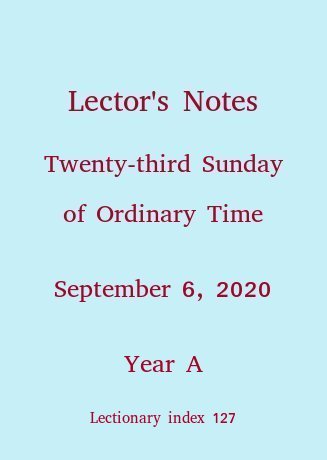

Lector's Notes, Twenty-third Sunday of Ordinary Time, year A, September 10, 2023
The prophet Ezekiel reports a vision in which God gives him certain very clear responsibilities.
Saint Paul spent much of the Letter to the Romans discussing the Law of Moses and its inability to save anyone. Now he pronounces a higher law.
Jesus instructs his followers on some fine points of getting along with each other. He gives all his disciples an authority he has given previously to Simon Peter.
The Theological Background: God wanted the people of Israel to have every chance to stay on the straight and narrow, turn from their sins, and avoid the destruction threatened by foreign invaders. So God takes a step to ensure that Israel has all it needs to stay morally upright. Most of all, they need a watchman, a human voice to challenge and correct them, so that the responsibility for their fate is only theirs. We'd call that fair; fair to the people if not to the hapless watchman.
But the watchman, the prophet Ezekiel, needs to be impressed with the importance of his duty. No prophet has an easy vocation (See last week's commentary about another prophet's calling), so God always takes pains to bolster the prophets, and in a variety of ways. Here Ezekiel gets straightforward orders assigning responsibility to him and to the people, with no if's, and's or but's tolerated.
Proclaiming It: The meaning of this passage isn't too difficult to discern, but the oral interpretation of it to an unprepared congregation will be challenging. It's hard to proclaim because it's one person talking to a second about the second's relationship to a third person and to a group.
When you proclaim this, imagine you are God talking to the prophet. You love him but you have to lay a heavy burden on his shoulders because you love the people and you're very worried about them. It should sound quite solemn.
Secondly, make every effort to speak slowly and distinctly. While the words are simple, the sentences are complex. Use contrasting tones of voice to distinguish "you" from "him" and "he." If you read this too fast or if you sound too flat, it will be lost on your hearers. Think of how carefully Ezekiel would have spoken his warnings to the wicked, knowing what was at stake!
The Theological Background: Most of Saint Paul's letters begin with a treatment of doctrinal questions. Then, having established important truths about Christ and our relationship to him, Paul usually writes a "morals" section, an application of the doctrine to the day-to-day behavior of the congregation receiving the letter. In the earlier doctrinal sections of Romans, Paul has written of the Law (by which he means the Law of Moses which the Jews so revered) and its inability to save anyone, no matter how well one keeps the Law. (Click here for a Sunday-by-Sunday survey of this spring and summer's readings from Romans, giving something of an outline of the letter.) In today's passage from the "how-to" section, he seems to be saying, "You still want the law? I'll give you the real law. Love one another. That fulfills the law. Enough said."
Proclaiming It: Read this slowly, and emphasize the word love every time it occurs. There's a long sentence in the middle that might tie your tongue if you haven't practiced. So practice. Read it aloud. Several times. Do it alone if it might embarrass you, or, better, before a small "congregation" like a family member or a friend.
The Church as a whole can well say, "We are Ezekiel, and God holds us responsible for warning the world when the world has gone astray."
Still frame from a youtube video posted by the contributor known as Captain Bijou. The video applies what I call the "Scope trope" to Mister Roberts, a 1948 play based on the 1946 novel of the same name by the American Thomas Heggen.
The Scope trope is the notion, popularized in a long-running series of television commercials by the makers of Scope mouthwash, that, assuming you're embarrassed to tell a loved one of his or her need for mouthwash, you should stash a bottle of Scope in that person's path. In Mister Roberts, crewmen on a U.S. Navy ship know they can count on their captain to visit frequently his on-board garden of potted plants and palm trees.
To see the whole 1-minute video, click here. A commentator on the page says of this commercial, "Originally seen in 1966, at the time Scope was introduced. "The Green Phantom" quickly gave way to a famous series of ads where someone dared tell someone else about their bad breath. …"
The author knows of a homilist who, on this Sunday of the liturgical cycle, probably in 1978, stashed a bottle of Scope in the ambo before mass. Having proclaimed today's gospel, he pretended to discover the bottle. Instead of taking umbrage, he preached hopefully of a Christian community like the one envisioned in Matthew 18, where member can correct member without fear.
This page updated August 13, 2023